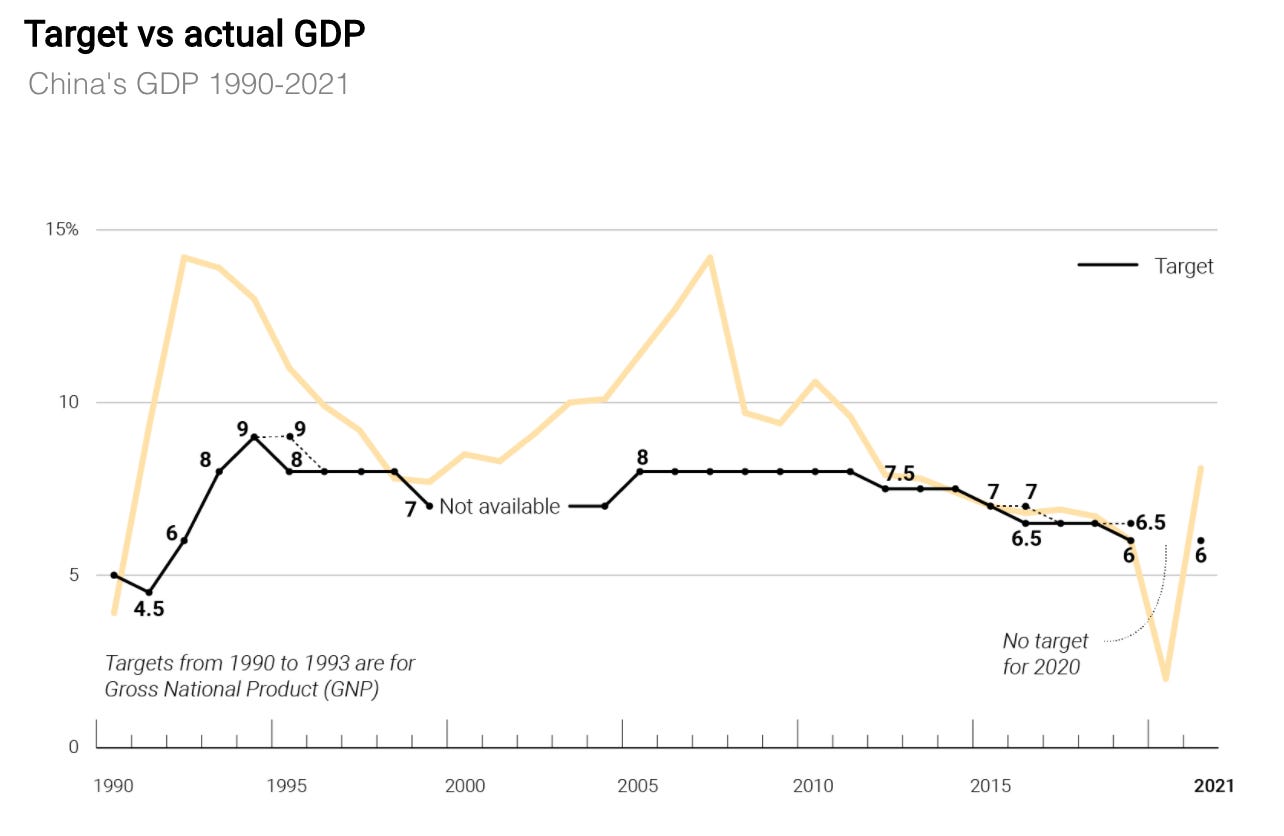Whither China for the next five years?
Notes from the recently concluded National People's Congress
Dear all
The week-long session of the National People’s Congress (NPC), officially the highest organ of state power in China, has now ended. Given its importance to steering China’s direction of travel, it is strange that it is not reported more widely in the Western media. Below are some of the highlights from the NPC, and what they mean for Chinese-Western relations.
In the meantime, thanks for reading; if you enjoy What China Wants then please do share and subscribe. I’ll be back on Saturday with the latest historical/cultural instalment.
***
Hong Kong
The only outputs from the NPC that made it into the broader Western press were the unanimously endorsed new measures aimed at tightening Beijing’s grip on the former British colony. It is clear that these are designed to be at the expense of the pro-democracy movement, which Beijing thinks of as a foreign plot to destabilise the country. “We will resolutely guard against and deter external forces’ interference in the affairs of Hong Kong and Macau,” said Chinese Premier Li Keqiang.
Part of the new election measures will be the appointment of a vetting committee to ensure Hong Kong's public officials are "patriots" who are loyal to the CCP. This has not gone without criticism. The new laws, says the former British Governor Lord Patten, “completely destroy the pledge of one-country, two-systems”. Other critics point out that Beijing has effectively removed political opposition from Hong Kong's government.
China is not to be put off, and indeed claims that these new laws are needed to make “one country, two systems” work. No wonder the Global Times, the CCP’s most loyal tabloid, has recently claimed that China is “fully prepared for ‘a long fight’ with West on HK”.
Yet Hong Kong has only taken up a small amount of the NPC’s energy. Here are a number of other announcements that China’s rivals should pay heed to:
Boosting Economic Development
The main thrust of the economic conversation held at the NPC is the next Five Year Plan, the country’s fourteenth. This of course makes for a potentially very dry discussion, analysing Provincial debt figures and working out how many factories need state support. Thankfully the Government’s propaganda department has put out a nifty little song to explain what the Plan is all about. (Be warned, you won’t have seen anything like this before):
Dancing minorities and raps about AI aside, the new Five Year Plan has the potential to fundamentally shift the current world economic system. At its heart the Plan calls for China to become more self-reliant on developing key technologies to reduce dependence on the United States and Europe for innovation. This is very likely to increase the distance between the two sides, and perhaps make a new version of the Cold War more likely.
The plan also aims to boost domestic consumption and to reduce economic reliance on exports of lower quality goods. China will instead strive to become an advanced manufacturing powerhouse, not only to boost economic growth, but to reduce the reliance on foreign nations too.
Between now and 2025 the country will focus on eight priority areas:
1. Rare earths and special materials.
2. Robotics.
3. Aircraft engines.
4. New energy vehicles and smart cars.
5. High-end medical equipment and innovative medicine such as vaccines.
6. Agricultural machinery.
7. Major equipment used in shipbuilding, aviation and high-speed rail.
8. Industrial applications of China’s Beidou global navigation satellite system.
As we have discussed in previous posts, China has an acknowledged and wide-ranging system of technology transfer, acquiring technologies from competitor developed economies and then incorporating them into their own science and technology base. Western companies with expertise in the list above need to work out how to protect themselves from being an unwitting part of the success of this plan.
The other big news story economically was the announcement that China is aiming for 6% economic growth in 2021. The GDP growth target for 2020 was abandoned in the face of the Covid pandemic, but the country still reported a better-than-expected rate of 2.3% last year. Although this was the slowest growth for 40 years (if the official figures are to be believed), China did end the year as the only major economy in the black.

Clamping Down on Big Tech
The ripples from the postponement of Ant Financial’s IPO and the “disappearance” of Jack Ma are still being felt, but Beijing has set a train in motion that shows no signs of slowing. With the traditional banking sector and their political allies still concerned about the perceived recklessness of the financial technology sector, fintech firms will see their ability to lend curtailed. And in case any of the tech oligarchs are tempted to follow Jack and start criticising the CCP, Beijing will also expand its efforts to stop monopolistic behaviour in the tech industry.
How this impacts the expansion of Chinese tech firms abroad is not yet known. What is for certain is that they might not be as confident of government support as they might once have been, and so potentially this will reduce their competitiveness against Western and developed Asian companies.
Further Expanding the Military
With the national budget impacted by Covid there was some expectation that military spending would be reined in, even temporarily. Xi’s stark words at the anniversary of the Korean War in about never allowing its interests to be undermined (a not very subtle jab at America) have been matched by yet another increase in the military budget, a 6.8% rise that takes spending to 1.355 trillion Yuan (USD 209 billion).
Given that some of this money will be spent on better preparing the People’s Liberation Army for a threatened invasion of Taiwan, it’s no surprise that the island nation (or renegade province if you’re sitting in Mainland China) is building a new generation of submarines.
Cementing Xi’s Position
Slogans have been part of Chinese political control for centuries, but the CCP has made them their own. A well respected China watcher, Bill Bishop in the United States has drawn attention to a new phrase appearing several times in the promulgations from the NPC: the “big national priority”. It appears that this phrase is designed to refer to Xi, linking him with China’s greatness. The phrase has thus been formulated to boost Xi’s further consolidation of power and his rightful place in the Chinese pantheon of the gods.
Relations with the West
The NPC did not dwell too much specifically on China’s relations with America and the West. Nonetheless much of what was announced shows how Beijing is seeking to push back on what it claims to be outside interference at best, or a concerted effort to contain China’s rise at worst. With this in mind, the first meeting of the revised Quad – America, India, Japan, and Australia – on 12th March has not gone down well in China, which is trying to portray the nascent alliance as “Cold War mentality” construct that will eventually fail.
Still, China and America are due to hold the first talks of the Biden Administration when the new Secretary of State, Antony Blinken, heads to Alaska on 18th March to meet China’s top diplomat, Yang Jiechi, and State Councillor Wang Yi.
A test as to how conciliatory Beijing is feeling will be the trial of the two Canadians being held in China in supposed retaliation for the arrest by Ottawa of the CFO of Huawei, Meng Wanzhou. If China heavily punishes the two men then the odds of a warmed up relationship with the West would seem to be low.
Overall, the NPC has reaffirmed China’s central position for the next five years: a confident, growing power that looks to reduce its exposure to the West whilst stamping its own authority where it can.
The question is, will America and its allies choose to publish a rival vision for the next half decade - or, as we have seen until now, will Western governments continue with their short-term agendas hoping that China will go away?
Judging from the first few months of the Biden Administration, the messaging from the Quad, and the UK’s increasing assertiveness about the PRC, it looks like the West may finally have woken up to Beijing’s overt plans. The next few months may see China’s developed nation rivals come up with their own version of a Five Year Plan, albeit in less detail. Just don’t expect to hear an accompanying song.


